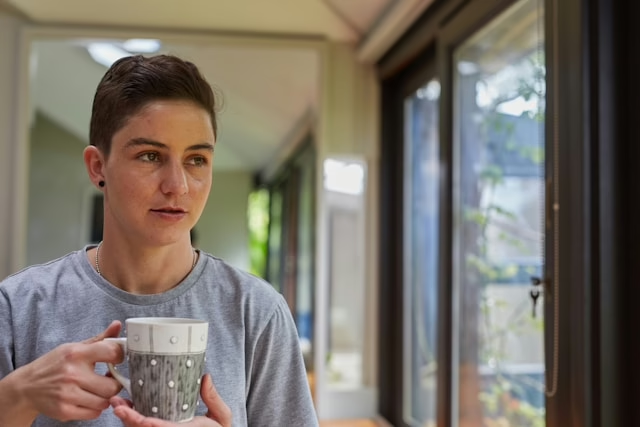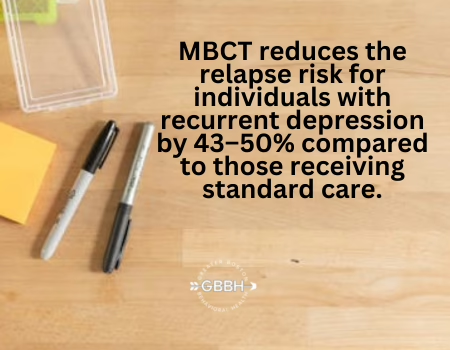Dual diagnosis, the coexistence of a mental health disorder and substance use disorder, is a complex and challenging condition that requires specialized care. For individuals with dual diagnosis, the interplay between mental health and substance use can create a cycle that is difficult to break without comprehensive, evidence-based treatment. One innovative and effective approach to addressing dual diagnosis is Mindfulness-Based Cognitive Therapy (MBCT). By integrating mindfulness practices with cognitive therapy techniques, MBCT helps individuals develop self-awareness, manage triggers, and build healthier coping mechanisms.
At Greater Boston Behavioral Health, we utilize MBCT as part of our Mental Health Programs, including Intensive Outpatient Programs (IOP), Partial Hospitalization Programs (PHP), and specialized therapies like Trauma Therapy Programs. This blog explores how MBCT works, its benefits for dual diagnosis, and how it fits into a holistic treatment plan.
Understanding Dual Diagnosis
Dual diagnosis affects millions of individuals in the U.S., with an estimated 9.2 million adults experiencing both a mental health disorder and substance use disorder each year. Common co-occurring conditions include:
- Depression and alcohol use disorder.
- Anxiety and opioid dependence.
- PTSD and stimulant use disorder.
The relationship between mental health and substance use is often bidirectional:
- Individuals may use substances to self-medicate mental health symptoms.
- Substance use can worsen or trigger mental health conditions.
Dual diagnosis requires an integrated approach that addresses both conditions simultaneously, recognizing their interconnected nature.
What Is Mindfulness-Based Cognitive Therapy (MBCT)?
MBCT combines principles of Cognitive Behavioral Therapy (CBT) with mindfulness practices. It was originally developed to prevent relapse in individuals with recurrent depression but has since been adapted for various mental health and substance use disorders. The core components of MBCT include:
1. Mindfulness Practices
Mindfulness involves cultivating awareness of the present moment without judgment. Techniques include:
- Breathing exercises.
- Body scans.
- Mindful movement, such as yoga.
2. Cognitive Restructuring
MBCT helps individuals identify and challenge unhelpful thought patterns that contribute to mental health and substance use issues. Participants learn to:
- Recognize triggers and automatic reactions.
- Develop alternative, healthier responses.
3. Emotional Regulation
By combining mindfulness with cognitive techniques, MBCT enhances emotional awareness and regulation, reducing the intensity of negative emotions like anger, fear, and sadness.
How MBCT Supports Dual Diagnosis Recovery
For individuals with dual diagnosis, MBCT offers a unique set of tools to address the complexities of their condition. Here’s how it helps:
1. Breaking the Cycle of Reactivity
Substance use often becomes a default response to emotional pain or stress. MBCT teaches individuals to pause, observe their emotions, and respond thoughtfully rather than react impulsively.
2. Managing Triggers
Mindfulness practices enhance self-awareness, enabling individuals to recognize internal and external triggers for substance use or mental health symptoms. By identifying these patterns, they can implement proactive coping strategies.
3. Reducing Cravings and Relapse Risk
Cravings are a significant challenge in dual diagnosis recovery. MBCT equips individuals with techniques to:
- Observe cravings without acting on them.
- Accept discomfort as temporary and manageable.
- Redirect attention to healthier activities.
4. Improving Emotional Regulation
For those struggling with depression, anxiety, or anger, MBCT fosters a greater sense of control over emotions. This is particularly beneficial for individuals in Anxiety Treatment Programs or Anger Management Programs.
5. Enhancing Self-Compassion
Dual diagnosis often carries stigma and self-blame. Mindfulness practices encourage self-compassion, helping individuals let go of guilt and focus on healing.
Integrating MBCT into Dual Diagnosis Treatment
At Greater Boston Behavioral Health, MBCT is seamlessly integrated into our holistic treatment plans. Here’s how it fits into our programs:
1. Partial Hospitalization Programs (PHP)
For individuals requiring intensive care, MBCT is incorporated into daily therapy sessions, providing tools to manage both mental health symptoms and substance use challenges.
2. Intensive Outpatient Programs (IOP)
MBCT is a cornerstone of our IOP, offering structured therapy that allows individuals to balance recovery with work, school, or family responsibilities.
3. Group Therapy Programs
Group settings are ideal for practicing mindfulness techniques and sharing experiences. Our Group Therapy Programs foster connection and mutual support among participants.
4. Trauma Therapy Programs
Unresolved trauma is a common underlying factor in dual diagnosis. MBCT complements Trauma Therapy Programs by helping individuals process traumatic memories with greater emotional stability.
5. Family Therapy Programs
Dual diagnosis impacts families, and MBCT can be extended to loved ones through Family Therapy Programs, teaching mindfulness techniques that improve communication and reduce conflict.
The Benefits of MBCT for Dual Diagnosis
MBCT offers a range of benefits that make it particularly effective for individuals with dual diagnosis:
1. Relapse Prevention
By addressing thought patterns and emotional triggers, MBCT reduces the risk of relapse in both mental health symptoms and substance use.
2. Holistic Healing
MBCT promotes a mind-body connection, supporting physical and emotional well-being. Techniques like yoga and mindful breathing improve overall health.
3. Long-Term Skills
Unlike short-term solutions, MBCT equips individuals with lifelong tools to manage stress, cravings, and emotional challenges.
4. Complementary to Other Therapies
MBCT works well alongside other therapeutic modalities, such as CBT, DBT, and medication-assisted treatment.
5. Accessibility
Mindfulness practices can be adapted for any environment, allowing individuals to use these techniques at home, work, or during stressful situations.
Scientific Evidence Supporting MBCT
Research has consistently demonstrated the effectiveness of MBCT for dual diagnosis and related conditions:
- A study published in the Journal of Consulting and Clinical Psychology found that MBCT reduced depression relapse rates by 50% compared to standard treatment.
- Research in the Addiction Research & Theory Journal highlighted MBCT’s role in reducing cravings and substance use in individuals with dual diagnosis.
- The American Psychological Association (APA) recognizes MBCT as an evidence-based practice for managing anxiety, depression, and stress.
How to Get Started with MBCT at GBBH
At Greater Boston Behavioral Health, we are committed to providing compassionate, evidence-based care for individuals with dual diagnosis. Our MBCT programs are tailored to meet each individual’s unique needs, combining mindfulness techniques with other therapeutic interventions.
What to Expect:
- Assessment and Personalization: We begin with a comprehensive assessment to understand your challenges and goals.
- Collaborative Treatment Planning: Our team works with you to design a treatment plan that integrates MBCT with other therapies.
- Ongoing Support: From individual sessions to group programs, we provide consistent guidance and encouragement throughout your recovery journey.
Why Choose Greater Boston Behavioral Health?
1. Expertise in Dual Diagnosis
Our team has extensive experience treating dual diagnosis, ensuring that both mental health and substance use challenges are addressed simultaneously.
2. Comprehensive Services
From Depression Treatment Programs to Trauma Therapy Programs, we offer a wide range of evidence-based therapies tailored to individual needs.
3. Flexible Care Options
Whether through PHP, IOP, or outpatient care, we provide the right level of support for every stage of recovery.
4. Convenient Location
As a trusted Mental Health Treatment Center in Boston, we are dedicated to serving individuals across the region with accessible, high-quality care.
Conclusion
Dual diagnosis can feel overwhelming, but recovery is possible with the right tools and support. Mindfulness-Based Cognitive Therapy offers a powerful way to manage symptoms, reduce relapse risk, and build a foundation for long-term well-being.
Contact Greater Boston Behavioral Health today at (888)278-0716 to learn more about our services, including Mental Health Programs, Trauma Therapy Programs, and Intensive Outpatient Programs. Let us help you take the first step toward healing and transformation.
FAQ on Mindfulness-Based Cognitive Therapy for Dual Diagnosis
What is Mindfulness-Based Cognitive Therapy (MBCT)?
MBCT combines mindfulness practices with cognitive behavioral therapy techniques to help individuals manage mental health symptoms and substance use challenges.
How does MBCT help with dual diagnosis?
MBCT addresses the interconnected nature of mental health disorders and substance use by teaching individuals to manage triggers, reduce cravings, and regulate emotions.
What mental health conditions can MBCT treat?
MBCT is effective for depression, anxiety, PTSD, and co-occurring conditions often associated with dual diagnosis.
How is MBCT integrated into treatment programs?
At Greater Boston Behavioral Health, MBCT is offered through Partial Hospitalization Programs (PHP), Intensive Outpatient Programs (IOP), Trauma Therapy Programs, and Group Therapy Programs.
Can MBCT prevent relapse?
Yes, MBCT reduces relapse rates for both mental health conditions and substance use by equipping individuals with skills to manage stress and cravings.
Is MBCT suitable for families?
MBCT techniques can be shared with loved ones through Family Therapy Programs, fostering a supportive home environment.


